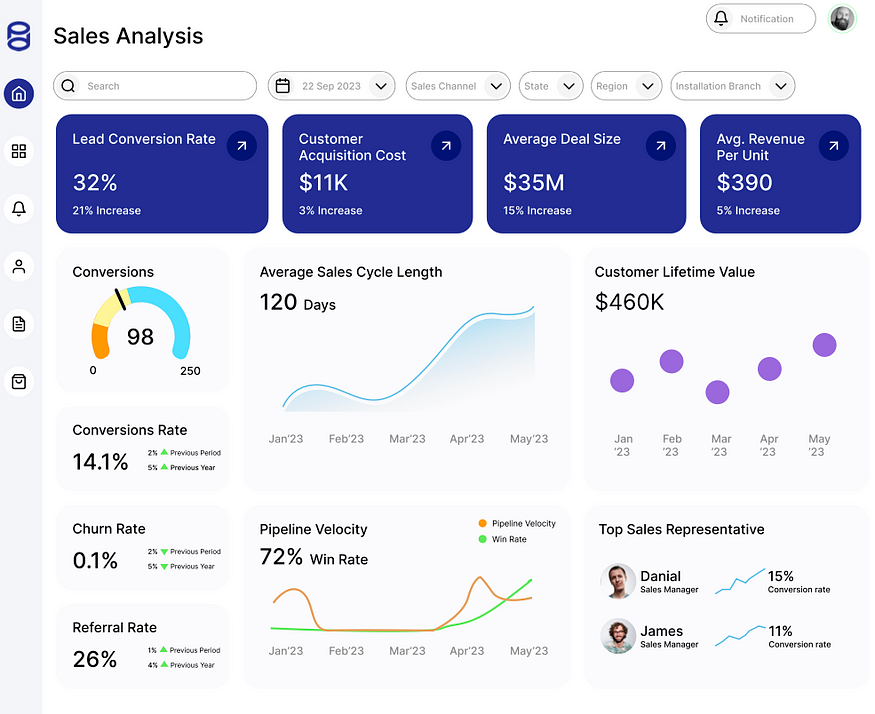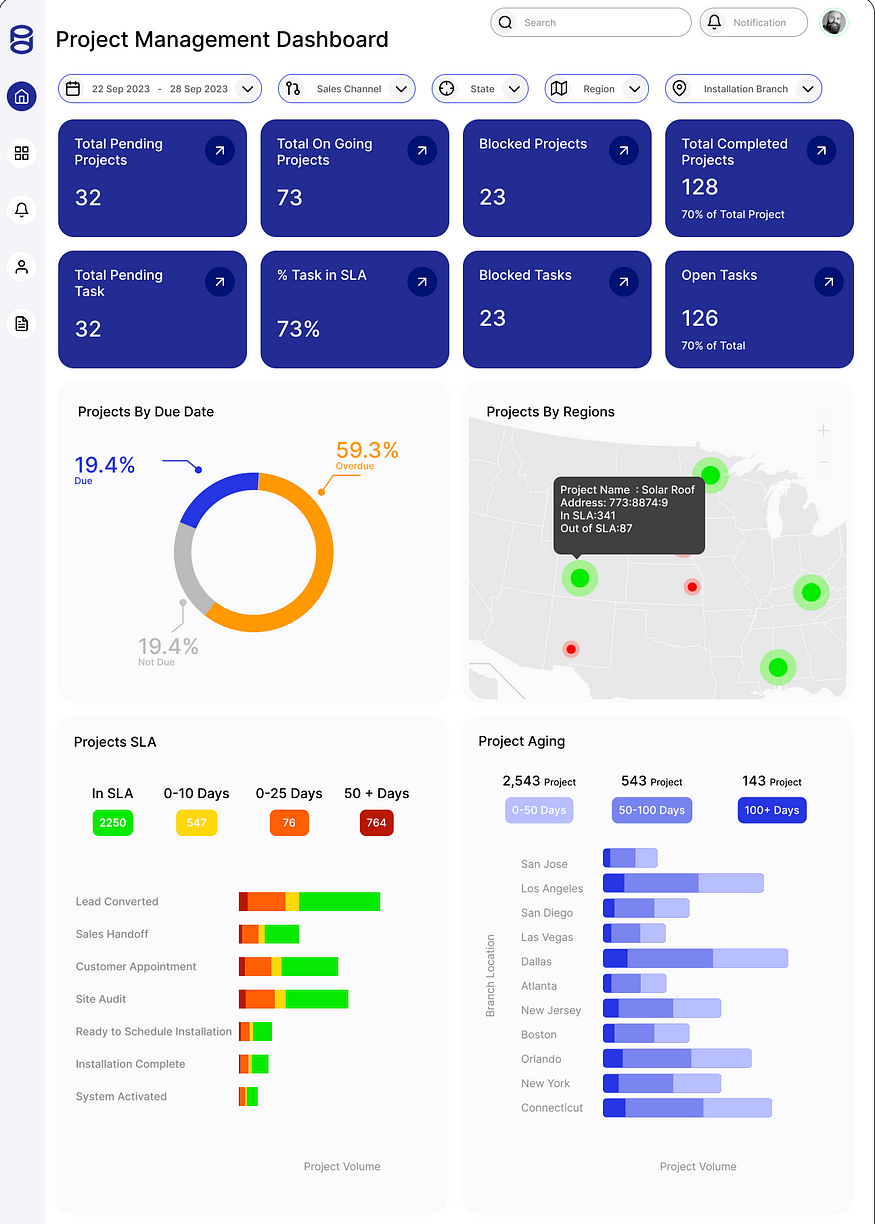Empowering Solar Sales and Operations with Analytics: Amplifying Efficiency and Sustainability for Solar Installers (Part 2)

The global shift towards renewable energy sources has propelled the residential / commercial solar industry into the spotlight. With increasing awareness about the environmental impact of traditional energy sources, homeowners or Businesses are embracing solar energy solutions. In this evolving landscape, the success of solar companies hinges on the efficient management of both sales and operations. This blog delves into the critical metrics and strategies that are pivotal for optimizing sales and operations in the thriving solar sector.
If you haven’t had the chance to explore Part 1 of our article, we encourage you to start there for essential insights before delving into this chapter
Solar Sales Analytics:


1. Lead Conversion Rate:
The lead conversion rate stands as a testament to the effectiveness of a company’s sales strategies and customer engagement efforts. A high conversion rate indicates not just successful sales techniques but also a deep understanding of customer needs and preferences.
2. Customer Acquisition Cost (CAC):
Monitoring the customer acquisition cost is essential to ensure that the company’s efforts to attract new customers remain both cost-effective and sustainable. By managing CAC, solar companies can allocate their marketing budget judiciously, maximizing returns on investment.
3. Average Sale Value:
The average sale value represents the monetary worth of a solar system installation. Higher average sale values directly contribute to increased revenue and profitability. Companies achieving this metric often offer comprehensive solutions tailored to individual customer requirements.
4. Sales Cycle Length:
A shorter sales cycle signifies operational efficiency. It reflects the company’s ability to swiftly move potential customers from their initial interest to a finalized sale. Shortening the sales cycle not only enhances efficiency but also allows the company to serve a larger customer base.
5. Customer Lifetime Value (CLV):
Understanding the long-term value of customers is crucial. Maximizing CLV involves building strong relationships, ensuring customer satisfaction, and tailoring marketing and sales efforts to foster customer loyalty. A high CLV indicates satisfied customers, leading to repeat business and positive referrals.
Solar Operations Analytics:
A) Project Operations Analytics


1. Project Schedule Adherence:
How closely the project adheres to its planned schedule, as well as any delays or accelerations.
2. Key Milestone Completion:
Tracking the achievement of critical Solar project milestones and their impact on the overall schedule
3. Project aging:
Tracking duration a Solar project has been in progress from its initiation to the current date.
B) Installation Ops Analytics:


1. Installation Time:
Swift installations are a cornerstone of customer satisfaction. Efficiently completing solar system installations from contract signing enhances customer trust and enables the company to take on more projects, thereby increasing revenue potential.
2. Quality Assurance:
Maintaining a high standard of quality assurance is paramount. A low percentage of installations with reported issues or complaints not only ensures customer satisfaction but also promotes positive reviews and referrals, bolstering the company’s reputation.
3. Inventory Management:
Efficient tracking and management of solar equipment and components are vital for smooth operations. Proper inventory management prevents shortages, delays, and excess stock, optimizing costs and resources.
4. Workforce Productivity:
Measuring the efficiency and output of the workforce is essential for optimal resource allocation. Monitoring workforce productivity aids in identifying areas for improvement, guiding training programs, and ultimately improving operational efficiency.
5. Customer Satisfaction Score (CSAT):
CSAT is a direct reflection of customer satisfaction with the company’s products or services. High CSAT scores indicate not just quality products but also exceptional customer service. Satisfied customers are more likely to spread positive word-of-mouth, leading to increased business opportunities.
Integration and Optimization:
Data-Driven Decision Making:
Utilizing data analytics provides valuable insights into customer behaviour, market trends, and sales patterns. Informed decision-making based on data analysis ensures that strategies are well targeted and aligned with market demands.
Streamlined Communication:
Effective communication channels between sales and operations teams are the backbone of seamless information flow. Clear communication ensures that project details are conveyed accurately, leading to efficient project handling and timely completion.
Continuous Training and Development(LMS):
Investing in training programs for sales and operations staff is an investment in the company’s future. Enhanced skills, product knowledge, and customer service abilities improve overall performance, leading to increased customer satisfaction and loyalty.
Customer Relationship Management (CRM) Systems:
Implementing CRM systems streamlines lead tracking, customer interactions, and project status monitoring. A well-integrated CRM system facilitates organized and efficient operations, ensuring that customer relationships are nurtured effectively.
Conclusion:
In the fiercely competitive solar industry, the synergy between sales and operations is paramount. By monitoring and optimizing these key metrics and embracing technological advancements, residential / commercial solar companies can navigate challenges and seize opportunities. A customer-centric approach, combined with efficient sales strategies and streamlined operations, not only ensures sustainable growth but also contributes significantly to the global shift towards renewable energy sources. As solar companies continue to evolve, the judicious use of metrics and strategic planning will remain fundamental to their success in this dynamic and ever-expanding market.
Continue reading to Part 3 of the Article which talks about the PV Solar Monitoring and Billing metrics
How Data platr Can help Unlock Data-Driven Decisions to Sales and Operations Teams for Solar Companies or Installers?
At Data platr Inc. we specialize in empowering solar installers or companies with cutting-edge cloud data platforms & Business Intelligence. We also specialize in Enterprise Applications like SAP, Oracle EBS, Workday, Salesforce to empower businesses to unlock the full potential of their data. Our pre-built enterprise data engineering models are designed to expedite the development of data pipelines, data transformation, and integration, saving you time and resources.
Our team of experienced data engineers, scientists and analysts utilize cutting-edge data infrastructure into valuable insights and helps enterprise clients optimize their Sales, Marketing, Operations, Financials, Supply chain, Human capital and Customer experiences.
Curious and would like to hear more about this article ?
Contact us at Info@dataplatr.com or Book time with me to organize a 100%-free, no-obligation call

